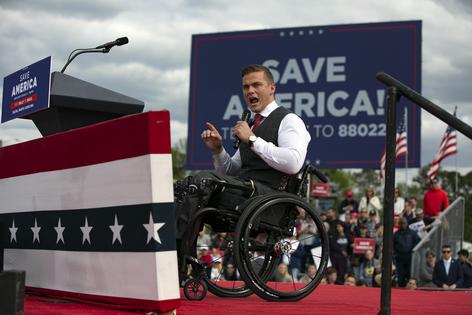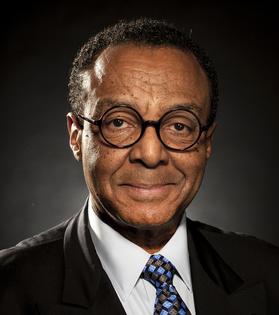‘Extremism Fatigue’ in Politics? Get Used To It
I was amused by an “unscientific opinion” survey of Republican primary voters in Arizona’s heated race for Democrat Mark Kelly’s Senate seat. Many said they’d grown tired of Republican candidates’ extremism.
“I know I don’t want any more GOP extremists — it’s exhausting,” said one resident from near Phoenix. “I don’t know that much about Mark Kelly, but he seems levelheaded.”
Tired of extremism? It may sound like extremism to you, ma’am, but it in today’s politics it’s called publicity.
This has been particularly true of Republican candidates as they vie for former President Donald Trump’s endorsement and his voters’ votes.
In Arizona, for example, Trump endorsed a venture capitalist named Blake Masters who said on a podcast this year that “Black people, frankly” are to blame for America’s gun violence problem.”
Masters talked in April on “The Jeff Oravits Show” about how “it’s gangs. It’s people in Chicago, St. Louis shooting each other. Very often, you know, Black people, frankly. And the Democrats don’t want to do anything about that.”
OK, as a still-proud Chicagoan, I’m tired of defending the city’s bloody — although, alas, hardly unique — crime problems, which Republican love to highlight as a case study in Democratic incompetence.
But I could not help but notice the paranoid vibe in what he said next: Democrats “are weak on crime” and “don’t like the Second Amendment,” Masters said, because “it frankly blocks a lot of their plans for us.”
Plans? What plans? And what does he mean by “us?”
But, of course, paranoia, along with generous helpings of “us” vs. “them” scenarios, are main ingredients in today’s porridge of right-wing fearmongering.
Masters seemed to be following a recipe from another Trump endorsee, Rep. Madison Cawthorn. Less than two days after his stunning defeat in North Carolina’s primary after one term in office, Cawthorn took to Instagram to post a defiant, typo-riddled promise to stage a “Dark MAGA” comeback.
“I am on a mission now to expose those who say and promise one thing yet legislate and work toward another, self-profiteering, globalist goal,” Cawthorn said. “It’s time for the rise of the new right, it’s time for Dark MAGA to truly take command.”
Whoo-oo-oo, I’m scared. Not.
But don’t get the idea that Republicans are the only party with a flamboyantly extremist fringe.
Rep. Alexandria Ocasio-Cortez, the famously progressive New York Democrat, posted an Instagram story recently to defend using the word “Latinx” to describe Hispanic men and women, slamming her Democratic colleagues who she said “rail against” it.
That’s true. Consultant James Carville and numerous pragmatic Hispanic leaders have criticized the term as popular among partisan elites but almost unknown and even hated among rank-and-file Hispanic voters, according to polls and anecdotal evidence.
Yet, AOC defended the term, saying, “It’salmost as though it has not struck some of these folks that another person’s identity is not about your reelection prospects. Like, this is not about you.”
No, but you don’t have to be a righteous partisan to understand that it is all about winning, which is not something that follows language that sounds elitist, presumptuous or out-of-touch with the voters you want to reach.
But, then there’s nothing new about factional disputes in the party that historically included Andrew Jackson and Jesse Jackson. (Yes, children, we should all know the old Will Rogers quote by now. “I don’t belong to an organized party; I’m a Democrat.”)
Extremism in politics reminds me of a couple of research studies around the 2016 election cycle that found voters in the U.S. and Europe complaining of “scandal fatigue.” The more scandals, interestingly enough, the more voters were desensitized to the scandals.
That seemed to be demonstrated later on by Trump’s first campaign, which seemed to not only be riddled with scandals, but able to thrive on them. The more he was criticized, they more his loyal following grew.
Whether we see more extremism in politics depends on how successful these primary campaigns happen to be. One thing is clear, though. Not all voters are looking for more food fights.
========
(E-mail Clarence Page at cpage@chicagotribune.com.)
©2022 Clarence Page. Distributed by Tribune Content Agency, LLC.
(c) 2022 CLARENCE PAGE DISTRIBUTED BY TRIBUNE MEDIA SERVICES, INC.










